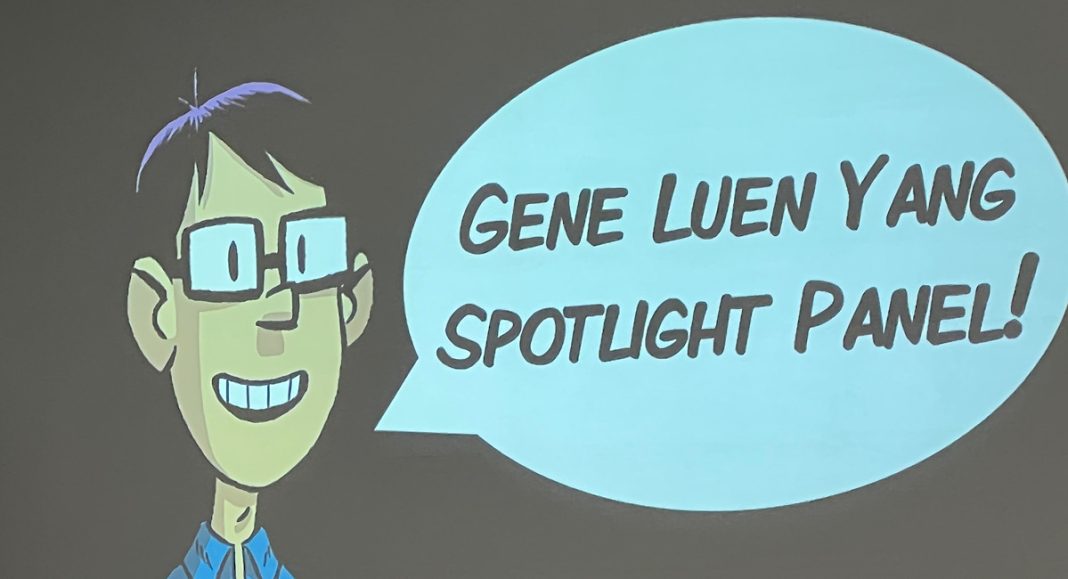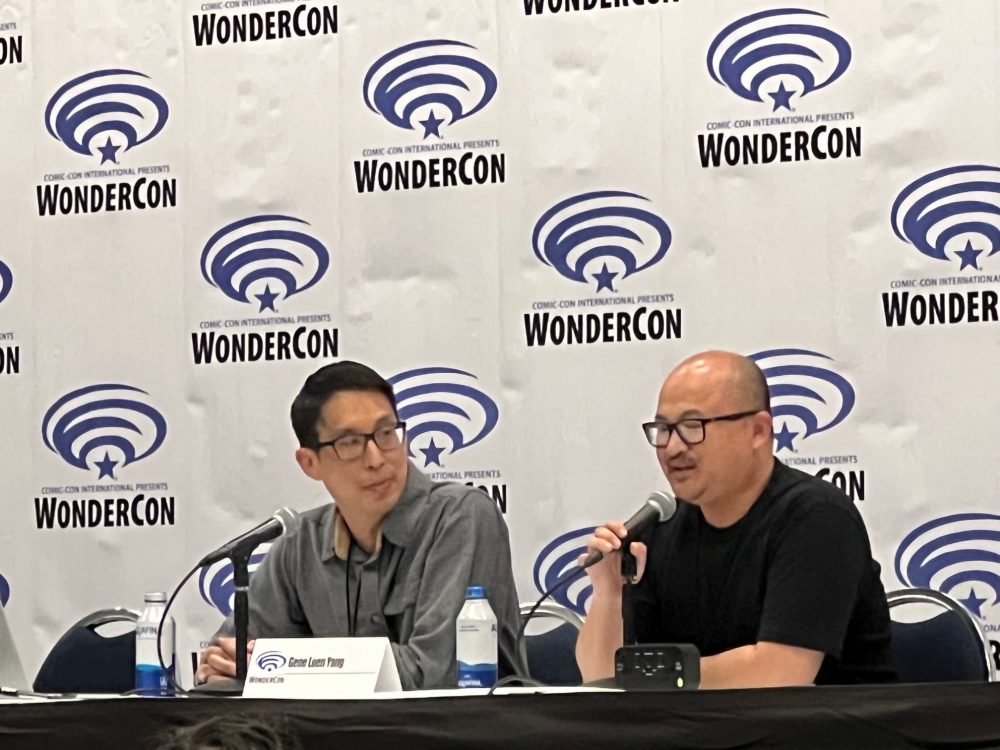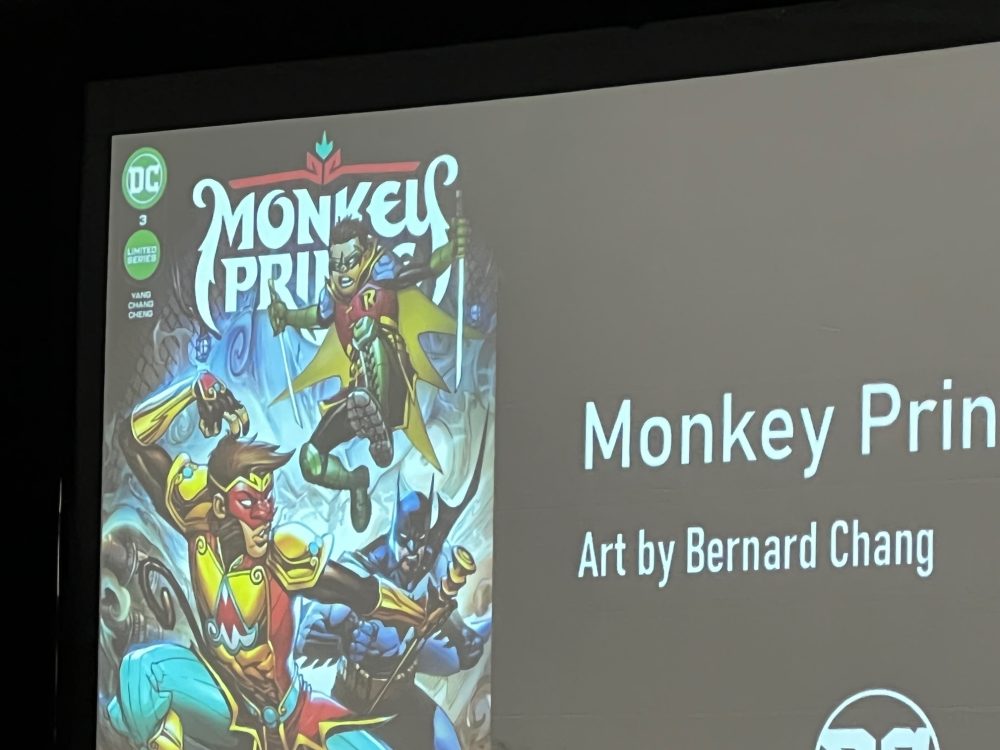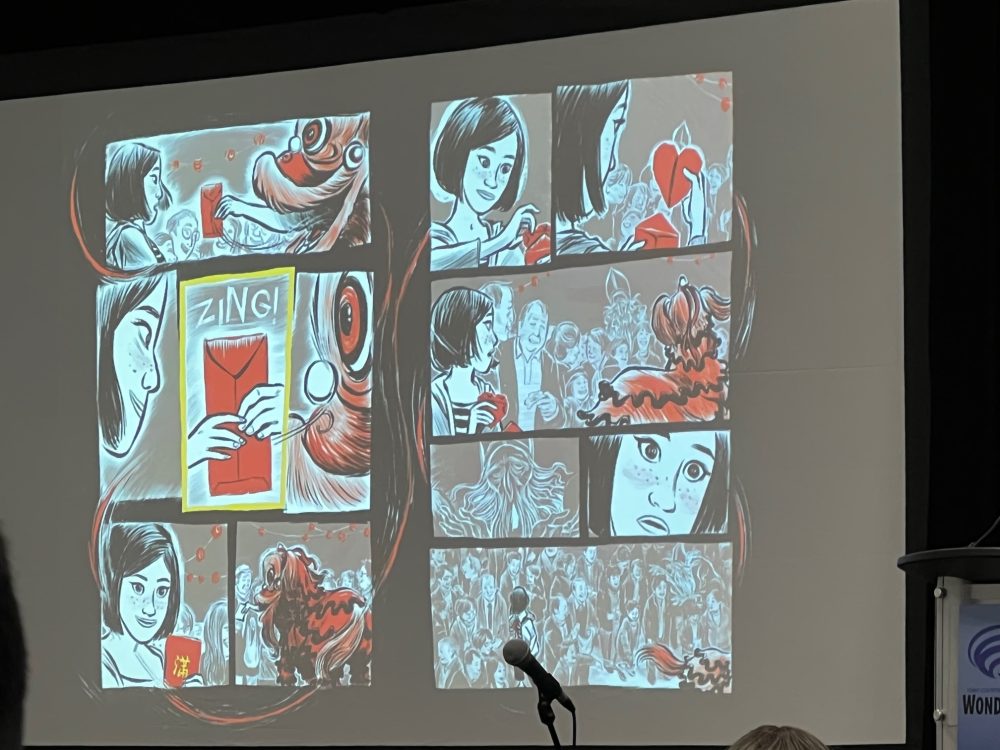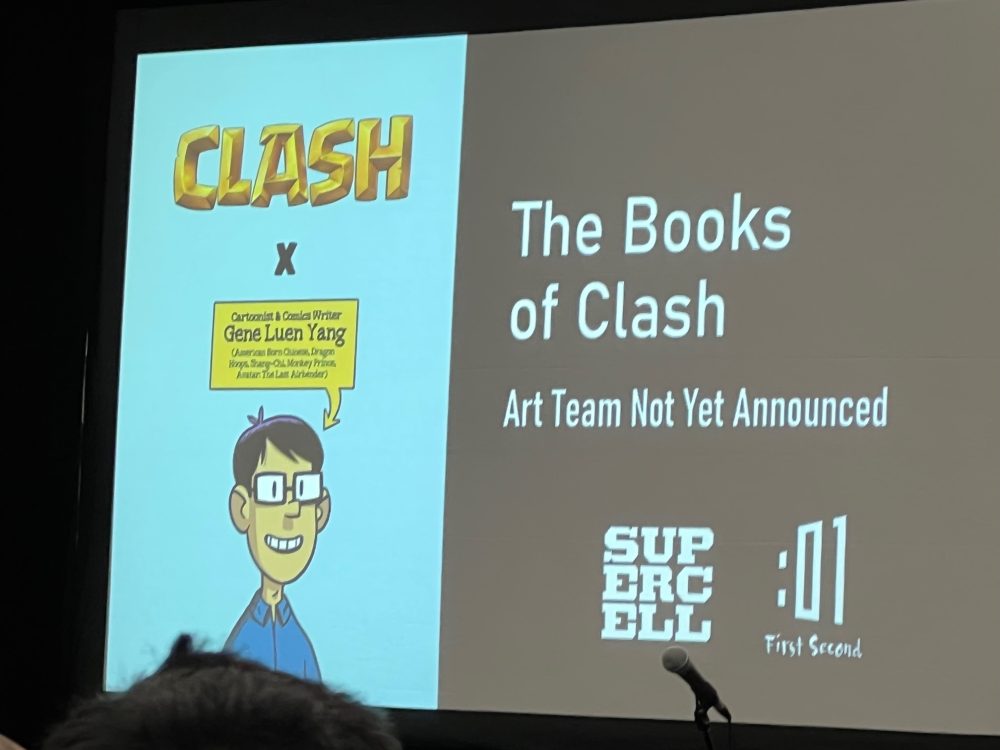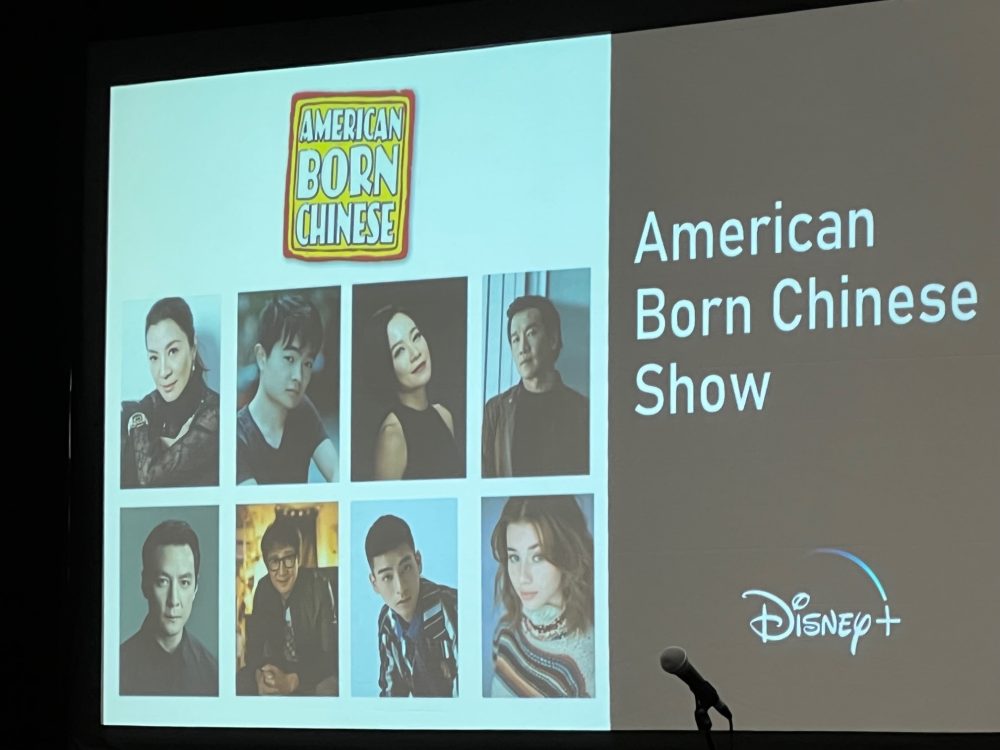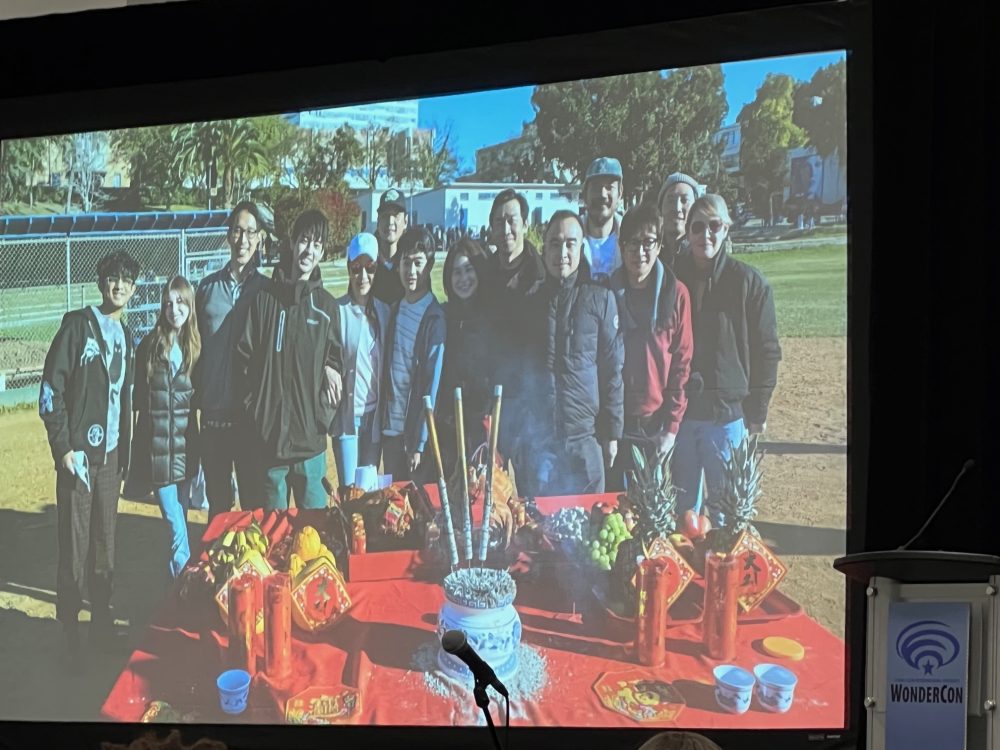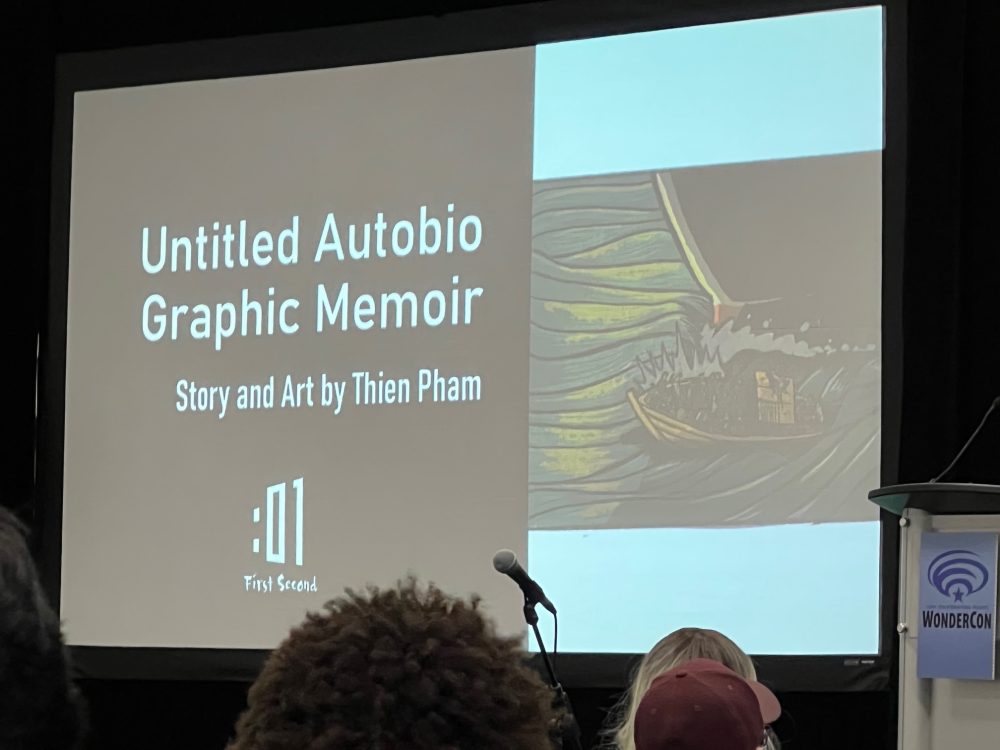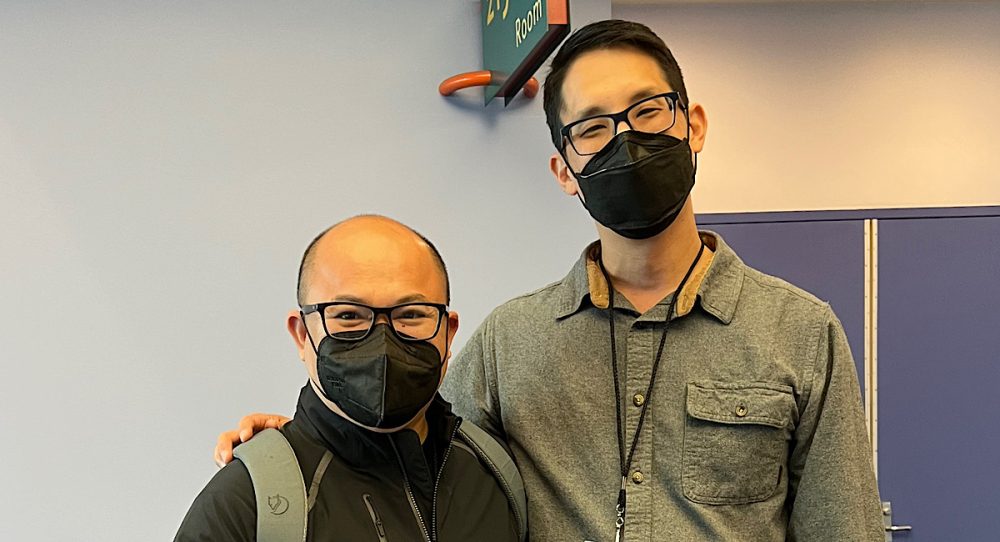A new Asian comedy duo steamrolled into WonderCon on Saturday, and it happened at the “Spotlight on Gene Luen Yang” panel. That’s right…the National Book Award nominated and Eisner Award winning Gene Yang and his BFF and sidekick Thien Pham lightly roasted each other playfully before running through a slideshow of book projects and on-set scenes from the Disney+ live-action adaptation of American Born Chinese. And they announced some very big news related to A Clash of Clans. But first, a quick recap of Yang’s career by his wise-cracking BFF.
High school hijinks: Level Up
It just so happened computer science teacher Yang and art teacher Pham found common group in cartooning while at an Oakland high school. The two teachers grew bored and started drawing. And they decided to collaborate on a book in that would become Level Up, with Pham working on the book while he was teaching. Pham assigned independent work to students so he could continue drawing at his desk.
“So, we’re not saying that the school is cool,” Pham quipped to Yang during the discussion. “We got to stop saying that.”
And the rest, as they say, is history.
The Great Pandemic spurs a creative streak: Shang Chi and The Monkey Prince
Yang was supposed to appear at WonderCon in 2020. But the Pandemic came. Yang was approached to do a reboot of Shang Chi.
“Shang Chi used to be a D-list Marvel character. I have to be honest; I was not a Shang Chi fan when I was a kid. And when I was asked to do the monthly series, I had some trepidation about it,” said Yang. “I started collecting when I was in the fifth grade. And I remember seeing Shang Chi comics, usually in the quarter bin at our local comic book store and feeling like if I pick this up and I bring it up to the register, I would be highlighting everything about myself that I wanted people to ignore. So, I just I never read any Shang Chi comics as a kid. When I was my 20s. I read a little bit of the Marvel Max series. And then when they asked me, maybe six months before the movie was originally supposed to come out, to read the monthly series, I had some hesitation about it. But ultimately, I decided to do it. One of the reasons I decided to do it was because the editor for this book is Darren Shan, and we had a long conversation about exactly that about how we both felt weird about Shang Chi when we were kids. What we wanted to do with Shang Chi was we wanted to really make him into a three-dimensional character.
To research before I started working on the series, I read a bunch of those old comics that I had avoided as a kid. There were some awesome things about it, obviously, like the way they depicted action. And you can also tell that the creators had an affection for the character. But my critique of it is that I think Shang Chi functions very differently from a lot of the other Marvel characters. With Spider Man, you’re actually supposed to really identify with Spider Man, right? That’s why they show him doing his laundry. That’s why they showed him struggling to take care of his elderly aunt. And Shang Chi’s appeal was that you were supposed to watch this like, kind of insane Chinese guy who barely got to do these really insane like kung fu movies. That was his appeal. So, what we wanted to do for the Shang Chi series was to bring him more into the Marvel mold where he would be a character that you would identify with, you would understand his flaws and his desires and his emotions.”
The original five-issue series of Shang Chi became an ongoing monthly series, a live-action movie, and a now a reboot that launches in July and will more closely align with the movie.
In recent months, Yang has written a DC series called The Monkey Prince and is also in the middle of adapting the Monkey King into a full-length graphic novel. With The Monkey Prince, Yang sought to create a character that fit within and lean into the DC universe, much like the role Greek mythology played in Wonder Woman.
Yang learned about the Monkey King as a child from his mother. Yang likened the Chinese literary classic Journey to the West to the works of William Shakespeare. Whereas Shakespeare’s plays contain hints of toilet humor, the Monkey King is “like Looney Tunes, but bloodier and more like fecal matter.” But he believed the character’s journey spoke at a deeper level:
“If look at the structure of Journey to the West, it’s about a monkey who starts becoming afraid, and he’s afraid because he realizes that he’s going to die, right? And the way he deals with his fear is he goes, and he gathers power. He goes to heaven, gets magic features and all these pellets. He’s like a drug addict. And those ancient Chinese drugs give him superpowers and immortality and he thinks, all right, I’m awesome. He becomes really arrogant and starts freaking out, breaking all this stuff in heaven. As punishment, Buddha buries him under a mountain of rock for 500 years. Ultimately, he gets spiritual redemption by becoming a servant to a Buddhist monk. And I just think that there’s something very wise about it. When we confront our mortality, often we get scared and our first impulse is to become hyper, like to get power, but that leads to a point where we’re buried under a rock and the only way to get out is to try to find a way to sort it out.”
Working on The Monkey King satisfied a lifelong dream of Yang’s…to bring this classic Chinese myth to new audiences.
“I’ve been in comics since the 90s. And I’ve always wanted to tell stories about Asian American characters. It has always seemed like an uphill battle, but within the last maybe year or two, I’ve had all these opportunities that I’d only dreamed of when I was starting in comics, and it feels like when it rains Asians it pours Asians.”
Yang the romantic
“Nine out of ten times, I forget our anniversary,” Yang said he talked about his new rom-com graphic novel with LeUyen Pham, Lunar New Year: A Love Story. Yang interviewed friends about their love lives (excluding Pham, as Pham wryly noted). Yang took inspiration from his courtship with his wife. They attended the same high school; she was a freshman and he a senior. His then girlfriend broke up with him because she wanted to become a nun, but Yang “beat God,” and won her over by drawing Lunar New Year cards since Lunar New Year often ran in tandem with Valentine’s Day. In the new graphic novel, the Lunar New Year cards play a role in a love triangle. The love interest is a Vietnamese American, and she’s caught between two good-looking Asian guys. A traditional lion dance is involved, and Yang’s collaboration with LeUyen Pham proved to be a rewarding experience. Yang showed sample pages LeUyen Pham created while testing out brushstrokes and colors.
A Clash is coming…
Clash of Clans and Clash Royale fans…Gene Yang is adapting the game into a graphic novel. Pham was a fan of the games, Pham’s students were fans, and a show of hands from audience members showed just how enthusiastic attendees were over the breaking news.
“We’re fans of Supercell. Supercell is the company that makes these games. And 10 years ago, when our [Yang’s and First Second editor Mark Siegel’s] kids were much younger, they were huge Clash of Clans fanatics. Mark and his family live on the east coast. My family and I live on the west coast, but our kids were the same ages. So, it was a way for our families to connect. But ever since then Mark and I have wanted to do a Clash book. But he would call Supercell to try to get a meeting, and at some point, he realized why they weren’t coming back is because the amount of money that they would make from a graphic novel is the money they make in four hours. It just wasn’t worth it to them financially. But eventually, 10 years later, he did get that feeling and he was able to convince them to do it. And that’s what this is right now. We have an amazing art team. They haven’t announced it yet so I can’t talk about that.”
Yang and Siegel settled on eight interconnected books, each of which will focus on a different character from the two games. Carl Barks, the Disney genius behind Donald Duck, served as Yang’s inspiration in how he conceived the Clash series. Barks took two-dimensional characterizations of Donald Duck from a cartoon and put them in comic book format, leveraging the strength of comics to give his characters a three-dimensional touch.
“With video games, at least like the mobile platform that Clash in on, the characters have to be two dimensional. But I want to bring it back to comics, the three dimensional. One of the challenges that we talked about for months was how it clashes with the look. All the troops of the same class look the same. All the archers are the same. All the barbarians are the same, all the same. So how do you tell a story where you care about the characters in a world like that? So, we came up with a solution. I hope people like it.”
American Born Chinese reborn
American Born Chinese was released in 2006, but Hollywood hadn’t come knocking since it was not raining Asians. Fast forward 12 years later, and the stars suddenly aligned. Yang was in LA promoting Panda Express’ Asian Nights (both Yang and Phan waxed nostalgic on the freebies that came along with it) and happened to have a chance meeting with producer Melvin Mar (Fresh Off the Boat, Jumanji: Welcome to the Jungle) that set the gears rolling. They exchanged contact information. They talked to networks interested in adapting the graphic novel to the small screen, but then the pandemic happened. Mar kept the idea alive and hooked up with two writers and brothers—Kelvin Yu (Bob’s Burgers) and Charles Yu (National Book Award winner)—and director Destin Daniel Cretton (Shang Chi) for the pilot. But with the success of Shang Chi, Yang was sure that Cretton would bounce before the pilot could be filmed. Cretton stayed and American Born Chinese was a go.
The series will star Michelle Yeoh (Shang Chi, Crouching Tiger, Hidden Dragon) as Guanyin and Ke Huy Quan (The Goonies, Indiana Jones and the Temple of Doom) as Freddy Wang, Ben Wang as the main character Jin Wang, Yeo Yan Yan, Chin Han, Daniel Wu as the Monkey King, Jim Liu, and Sydney Taylor.
“Destin wanted authentic accents. When we were going through casting, he would always give preference to people who were not faking their accent, not acting. Their accent was real. For example, Yan Yan who plays the mom, is Singaporean. She had a flipper accent, so it sounds more like a Mandarin accent. But he still preferred that to an Asian American who would have to fake the accent. And he did that for Shang Chi as well. I think that decision, if you look at the mushy scenes where people are talking in excess, is why those scenes are emotionally effective. In my opinion, it’s because you’re not conscious that actor is pretending to be something. That’s why they have they have these actors who would establish themselves in the Asian market.”
Yang proceeded to present a slide show of cast photos and set designs that evoked the daily life of a typical Asian American family.
“The reason why I want to show these is because when I walked through that set for the very first time, I was almost in tears,” said Yang. “I just felt the love and the care and the detail that they put in the set felt like a piece of my life. A lot of the pieces I’m going to show you, I’m pretty sure, are not going to end up in the show, but it just shows how much care they put into it.”
Yang turns the tables on Pham
Once Yang finished his talk on American Born Asian, he turned the tables on his BFF and gave Pham the opportunity to promote an as-yet-unnamed 2023 autobiographical graphic novel. And the wisecracking about day job, day-side job was once again at play.
“When I teach, I don’t have a lot of time. But during the pandemic on Zoom, it was a tough time. I do feel that remote teaching was amazing because I just got to draw comics at home as a teacher on microphone. So I was able to work on comics, and I was just putting things up,” said Pham. “I came here to America from Vietnam when I was five years old. And I’ve always wanted to tell that story. And Gene was always like, ‘You got to tell that story.’ But I never felt I was ready artistically or emotionally or maturity wise. Now at 50 years old, I’m finally ready to tell this story. And so, I did it on Instagram, not really expecting anything. And our publisher First Second decided to pick it up.”
Pham wanted the memoir to be told through the lens of all the meals he loves, “because that’s the only way I remember things.”
Will there be a Vietnamese-Born American? Anything is possible. But one thing was clear. Yang was enthusiastic, calling this unnamed title some of the best work he’s seen from Pham.
Sample pages of Pham’s work can be found on his Instagram account.
Faith and the perception of American Born Chinese outside America
During the Q&A portion of the “Spotlight on Gene Luen Yang” panel, a question about how faith plays a role in culture was posed to Yang, and he had an interesting view of his own faith.
“I grew up in a Chinese Catholic community. I’m still a practicing Catholic. I’ve married a Korean American so I’m going to a Korean Catholic Church. I think like a lot of a lot of people who are part of a faith tradition, there’s a lot of tension. I constantly feel this tension about faith, and especially being part of a Western faith tradition in an Eastern culture. What I found though, is that stories often come out of passion. So I’ve tried to do that. When I was in college, I minored in creative writing. And one of my creative writing teachers told me, I talked to her about how to write about religion, and faith and metaphysics and all that kind of stuff. And she was like, ‘You should never write about faith. You should write your life and live your faith. And then if your faith is actually a part of your life, it’ll come out in a more natural way.’ I think there’s a lot of wisdom in that because I think when you try to write about your faith, what comes out is clean. Faith has got stents in it, and it’s got hairs in it. Those sorts of things need to be part of the art.”
Another question centered on how readers outside of the United States interpreted the themes and message of American Born Chinese. Yang did not know, but he felt the common thread was the feeling of being an outsider.
“It seems like almost all of us have had that experience at some point in our lives. It might not be our cultural heritage, but it could be something else about us that makes us an outsider. I do hear from time-to-time from readers overseas, and they usually point to that as the connective tissue.”
One of the final questions Yang received was on his love of Superman. Superman, according to Yang, represents something deeply personal to him.
“I have to say when I was collecting, I wasn’t a fan of Superman. I thought Superman was the most boring superhero. But at some point, I think I made the realization that maybe Superman is boring for the same reason my parents were boring. My parents when I was growing up, at least outside of the home, were really boring people. They went to work. They didn’t make any fuss at work. My dad was stuck in middle management for his entire career. Paid the bills on time, didn’t make a fuss. But as an adult, I think they were not boring people because they were in medical careers. They came to a country that did not speak their primary language. They got master’s degrees in midwifery, so that is the least boring thing ever. So, I began to wonder, did they live this “boring life” when they got to America? Because they were a little bit freaked out that if they were not boring, people would question their citizenship. And then when I look at Superman, I think it’s the same thing. Maybe he’s boring and he presents himself as this big blue Boy Scout. Because deep down inside, he knows he’s an alien, and he doesn’t want people to question the citizenship.”
The “Spotlight on Gene Luen Yang” was entertaining, but it was also a heartfelt tribute to a team of artists that brought Asian American comics and culture to the forefront, and the audience loved them more for it.
Miss any of our previous WonderCon 2022 coverage? Click here!


